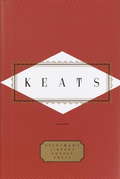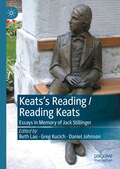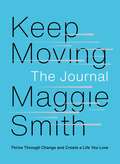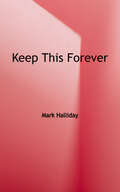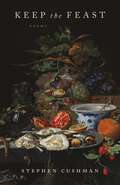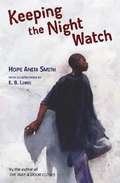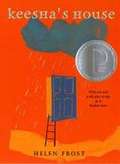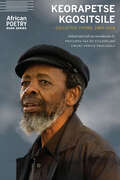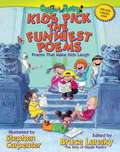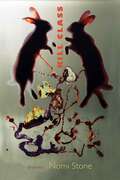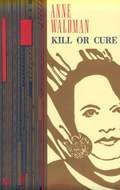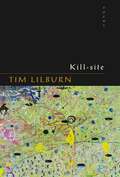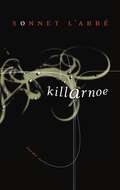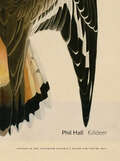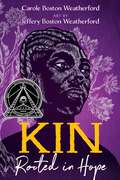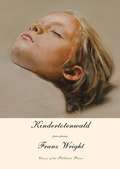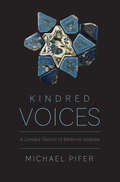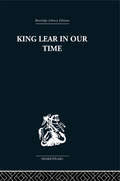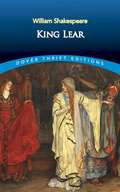- Table View
- List View
Keats: Poems
by John KeatsThese Everyman's Library Pocket Poets hardcover editions are popular for their compact size and reasonable price which do not compromise content. Poems: Keats contains a full selection of Keats's work, including his lyric poems, narrative poems, letters, and an index of first lines.
Keats’s Reading / Reading Keats: Essays in Memory of Jack Stillinger
by Daniel Johnson Beth Lau Greg KucichThis book explores John Keats’s reading practices and intertextual dialogues with other writers. It also examines later writers’ engagements with Keats’s poetry. Finally, the book honors the distinguished Keats scholar Jack Stillinger and includes an essay surveying his career as well as a bibliography of his major publications. The first section of the volume, “Theorizing Keats’s Reading,” contains four essays that identify major patterns in the poet’s reading habits and responses to other works. The next section, “Keats’s Reading,” consists of six essays that examine Keats’s work in relation to specific earlier authors and texts. The four essays in the third section, “Reading Keats,” consider how Keats’s poetry influenced the work of later writers and became embedded in British and American literary traditions. The final section of the book, “Contemporary Poetic Responses,” features three scholar-poets who, in poetry and/or prose commentary, discuss and exemplify Keats’s impact on their work.
Keep Moving: Thrive Through Change and Create a Life You Love
by Maggie SmithBased on the national bestseller Keep Moving—called &“a meditation on kindness and hope&” (NPR)—a 52-exercise journal about hope and renewal from the award-winning poet and author of You Could Make This Place Beautiful. As Maggie Smith navigated loss and upheaval, she wrote to herself each day—forgiving herself for a past mistake, reflecting on moments of joy, or looking towards the future, ending each note-to-self with the phrase &“keep moving.&” In her own words, &“I wasn&’t offering wisdom from on high; I was talking to myself at the bottom of a dark well, trying to climb up into the light, little by little, day by day.&” Smith was surprised not only by how uplifting this process was, but also by the outpouring of support and gratitude from thousands of people who found solace in her words. Through the healing power of writing, Keep Moving: The Journal invites us to find beauty in the present moment, embrace change, and create a life we love.
Keep This Forever
by Mark HallidayIn this book, the author proves to be one of America's most intimate poets. Like Frank O'Hara and Kenneth Koch, his poems chat with the reader in earnest yet humorous ways and in wholly believable voices. Whether exploring grief or desire or loneliness, these poems never forget the human longing for permanence. "He is prolix and quotidian, a Whitman in a supermarket, a confessional poet who does not take himself very seriously.... His cool patter skewers pomposity..."--The New Yorker.
Keep on Singing: A Ballad of Marian Anderson
by Myra Cohn Livingston"When she sang Deep River, One teacher wondered why A tall, calm girl at twilight Should make him want to cry." (The teacher was Arturo Toscanini.) Other books by this American poet are available in this library.
Keep the Feast: Poems
by Stephen CushmanStephen Cushman’s Keep the Feast sings in the tradition of the psalmists and devotional poets, offering an intimate, ecstatic doxology, both exultant and indicting, spiritual and secular. His poems make prodigious and intrepid forays into the realms of history, sexuality, religious ardor, the imperiled planet, and the reasons for making art. At the heart of this three-part book lies the title poem, which takes as a formal model Psalm 119, the longest psalm in the Bible. In luminous verse, Cushman’s speaker rejoices in the commitments of faith, finding in them a way of living with the paradoxes of twenty-first-century life and of holding belief in an often-unfathomable world.
Keeping the Night Watch
by Hope Anita SmithSo many unanswered questions weigh down thirteen-year-old C.J. As he struggles to understand why his father walked out. His father is back now, though C.J. Is not as quick to forgive as the other members of his family. He still feels the weight of responsibility that fell on his shoulders when Daddy was gone, and he's not prepared to give that up. But C.J.'S anger is making him a stranger in his own home, and instead of life seeming better now that Daddy has returned, it feels worse. Through powerful poems, Hope Anita Smith chronicles the nuanced emotions of a family that is slowly learning to heal and put the pieces back together.
Keesha's House
by Helen FrostAn unforgettable narrative collage told in poems Keesha has found a safe place to live, and other kids gravitate to her house when they just can’t make it on their own. They are Stephie – pregnant, trying to make the right decisions for herself and those she cares about; Jason – Stephie’s boyfriend, torn between his responsibility to Stephie and the baby and the promise of a college basketball career; Dontay – in foster care while his parents are in prison, feeling unwanted both inside and outside the system; Carmen – arrested on a DUI charge, waiting in a juvenile detention center for a judge to hear her case; Harris – disowned by his father after disclosing that he’s gay, living in his car, and taking care of himself; Katie – angry at her mother’s loyalty to an abusive stepfather, losing herself in long hours of work and school. Stretching the boundaries of traditional poetic forms – sestinas and sonnets – Helen Frost’s extraordinary debut novel for young adults weaves together the stories of these seven teenagers as they courageously struggle to hold their lives together and overcome their difficulties.
Keorapetse Kgositsile: Collected Poems, 1969–2018 (African Poetry Book)
by Keorapetse KgositsileKeorapetse Kgositsile, South Africa&’s second poet laureate, was a political activist, teacher, and poet. He lived, wrote, and taught in the United States for a significant part of his life and collaborated with many influential and highly regarded writers, including Gwendolyn Brooks, Sterling Plumpp, Dudley Randall, and George Kent. This comprehensive collection of Kgositsile&’s new and collected works spans almost fifty years. During his lifetime, Kgositsile dedicated the majority of his poems to people or movements, documenting the struggle against racism, Western imperialism, and racial capitalism, and celebrating human creativity, particularly music, as an inherent and essential aspect of the global liberation struggle. This collection demonstrates the commitment to equality, justice, and egalitarianism fostered by cultural workers within the mass liberation movement. As the introduction notes, Kgositsile had an &“undisputed ability to honor the truth in all its complexity, with a musicality that draws on the repository of memory and history, rebuilt through the rhythms and cadences of jazz.&” Addressing themes of Black solidarity, displacement, and anticolonialism, Kgositsile&’s prose is fiery, witty, and filled with conviction. This collection showcases a voice that wanted to change the world—and did.
Khasi Folk Songs and Tales
by Desmond L. Kharmawphlang A.R. TripathiThe dialects and languages spoken by tribals in India are very large in number. The literary compositions in most of them have survived in oral form, though some tribal languages have taken to writing as a means of recording literary compositions. Documented and translated into English by Desmond L. Kharmawphlang. Translated into Hindi by A. R. Tripathi.
Kicks: Sneaker Microfiction And Poetry
by Van G. Garrett“A brilliantly written and illustrated ode to sneakers and sneakerheads, young and old. A gift to us all.” —Angie Thomas, #1 New York Times bestselling authorA fun, lyrical debut picture book, Kicks is an essential read for sneaker fans of all ages, from award-winning poet Van G. Garrett and New York Times bestselling illustrator Reggie Brown.This is a love letter to sneakers. But not just any sneakers. Only the flyest, floatiest, you-est kicks you can get—the ones that let you soar!This colorful, rhythmic adventure has something to offer anyone who prizes a great pair of shoes and any reader who loves to play with words.
Kids Pick The Funniest Poems: Poems That Make Kids Laugh (Giggle Poetry)
by Bruce Lansky Stephen CarpenterBetcha laugh!This is one of the most popular collections of funny poetry for kids ever published. It's a classic because it's the first collection of poems selected by kids! It includes clever creations from some of the most popular names in children's poetry, including Bill Dodds, Timothy Tocher, Joyce Armor, Robert Pottle, Bruce Lansky, and Kenn Nesbitt. Humorous illustrations by Stephen Carpenter make this book even better.
Kill Class: Poems
by Nomi StoneA poet and anthropologist explores the surprising world of war games in mock Middle Eastern villages in which the U.S. military trains. With deft lyrical attention, these documentary poems reveal the nuanced culture and violence of the war machine--alive and well within these basecamp villages, the American military, and, ultimately, the human heart. Kill Class is based on Nomi Stone's two years of fieldwork in mock Middle Eastern villages at military bases across the United States. The speaker in these poems, an anthropologist, both witnesses and participates in combat training exercises staged at Pineland, a simulated country in the woods of the American South, where actors of Middle Eastern origin are hired to theatricalize war, repetitively pretending to bargain and mourn and die. Kill Class is an arresting ethnography of American military culture, one that allows readers to circle at length through the cloverleaf interchanges where warfare nestles into even the most mundane corners of everyday life.
Kill or Cure
by Anne Waldman"Kill Or Cure," a bold prescriptive for these apocalyptic days, brings together substantial new work as well as the best of Anne Waldman's previously uncollected poetry. It includes credos, manifestos, dreams, homages to literary predecessors, "Shaman Hisses You Slide Back Into The Night" (the journal poem written during Bob Dylan's historic Rolling Thunder Revue), witty political diatribes, travel vignettes, incantations, and a new section of the ongoing epic poem "Iovis," a powerful meditation on male energy.
Kill-site
by Tim LilburnBy the winner of the Saskatchewan Book Award for Best Book of the YearTo his virtuoso collection of new poems, Tim Lilburn brings a philosopher’s mind and the eyes and ears of a marsh hawk. This series of earthy meditations makes the strange familiar and the familiar strange. Lilburn’s close study of goldenrod, an ice sheet, or night opens into surprising interior and subterranean worlds. Pythagoras lurks within the poplars, Socrates in stones, people fly below the ground. Elsewhere, the human presence of motels and beer parlours is ominous. Kill-site is an exploration of a human’s animal nature. Lilburn invites the reader to: “Go below the small things… then / walk inside them and you have their kindness.” Though a natural progression from Lilburn’s last book, To the River, in Kill-site, the poet moves toward a greater understanding of the human, of sacrifice.
Killarnoe
by Sonnet L'AbbeWith its razzle-dazzle wordplay and kaleidoscope of subjects, Sonnet L’Abbé’s second collection of poems is a tour-de-force. L’Abbé invents her own unique poetics, coupling a glittering variety of patterns with tumbling rhythms and rhymes. And with this refreshed language, she reconsiders all the rules for twenty-first-century life. The poems work like a whirlwind, ranging from the intimacy of infancy to the shock of whole civilizations razed by war, and are infused with a political undertone that reveals a child’s emerging understanding of identity, of specific citizenship, of bodies physical and psychological, of language, imagination, and dream. Whether funny or funky, candid or subtle, amused and ironic or stunned in fright, the poems are guided by a fierce intelligence that never oversimplifies the world. Killarnoe, the poet tells us, “is a place I invented right now. I just built it from my head.” And in its reconsideration of what it means to be, Killarnoe is fascinating, charged, and inspired.
Killdeer: essay-poems (Department of Critical Thought #4)
by Phil HallWINNER OF THE 75th GOVERNOR GENERAL'S LITERARY AWARD FOR POETRYWINNER OF THE 25th TRILLIUM BOOK PRIZEWINNER OF AN ALCUIN AWARD FOR DESIGNSHORTLISTED FOR THE GRIFFIN POETRY PRIZEThese are poems of critical thought that have been influenced by old fiddle tunes. These are essays that are not out to persuade so much as ruminate, invite, accrue.Hall is a surruralist (rural & surreal), and a terroir-ist (township-specific regionalist). He offers memories of, and homages to -- Margaret Laurence, Bronwen Wallace, Libby Scheier, and Daniel Jones, among others. He writes of the embarrassing process of becoming a poet, and of his push-pull relationship with the whole concept of home. His notorious 2004 chapbook essay The Bad Sequence is also included here, for a wider readership, at last. It has been revised. (It's teeth have been sharpened.)In this book, the line is the unit of composition; the reading is wide; the perspective personal: each take a give, and logic a drawback.Language is not a smart-aleck; it's a sacred tinkerer.Readers are invited to watch awe become a we.In Fred Wah's phrase, what is offered here is "the music at the heart of thinking."
Kin: Rooted in Hope
by Carole Boston WeatherfordA Coretta Scott King Honor Book An &“imaginative and moving&” (The Horn Book, starred review) portrait of a Black family tree shaped by enslavement and freedom, rendered in searing poems by acclaimed author Carole Boston Weatherford and stunning art by her son Jeffery Boston Weatherford.I call their names: Abram Alice Amey Arianna Antiqua I call their names: Isaac Jake James Jenny Jim Every last one, property of the Lloyds, the state&’s preeminent enslavers. Every last one, with a mind of their own and a story that ain&’t yet been told. Till now. Carole and Jeffery Boston Weatherford&’s ancestors are among the founders of Maryland. Their family history there extends more than three hundred years, but as with the genealogical searches of many African Americans with roots in slavery, their family tree can only be traced back five generations before going dark. And so from scraps of history, Carole and Jeffery have conjured the voices of their kin, creating an often painful but ultimately empowering story of who their people were in a breathtaking book that is at once deeply personal yet all too universal. Carole&’s poems capture voices ranging from her ancestors to Frederick Douglass to Harriet Tubman to the plantation house and land itself that connects them all, and Jeffery&’s evocative illustrations help carry the story from the first mention of a forebear listed as property in a 1781 ledger to he and his mother&’s homegoing trip to Africa in 2016. Shaped by loss, erasure, and ultimate reclamation, this is the story of not only Carole and Jeffery&’s family, but of countless other Black families in America.
Kindergarten Kids: Riddles, Rebuses, Wiggles, Giggles, And More! (Into Reading, Read Aloud #Module 1, Book 3)
by Stephanie Calmenson Melissa SweetNIMAC-sourced textbook
Kindertotenwald
by Franz WrightA genre-bending collection of prose poems from Pulitzer Prize-winner Franz Wright brings us surreal tales of childhood, adolescence, and adult awareness, moving from the gorgeous to the shocking to a sense of peace. Wright's most intimate thoughts and images appear before us in dramatic and spectral short narratives: mesmerizing poems whose colloquial sound and rhythms announce a new path for this luminous and masterful poet. In these journeys, we hear the constant murmured "yes" of creation--"it will be packing its small suitcase soon; it will leave the keys dangling from the lock and set out at last," Wright tells us. He introduces us to the powerful presences in his world (the haiku master Basho, Nietzsche, St. Teresa of Avila, and especially his father, James Wright) as he explores the continually unfolding loss of childhood and the mixed blessings that follow it. Taken together, the pieces deliver the diary of a poet--"a fairly good egg in hot water," as he describes himself--who seeks to narrate his way through the dark wood of his title, following the crumbs of language. "Take everything," Wright suggests, "you can have it all back, but leave for a little the words, of all you gave the most mysteriously lasting." With a strong presence of the dramatic in every line, Kindertotenwald pulls us deep into this journey, where we too are lost and then found again with him.From the Hardcover edition.
Kindred Voices: A Literary History of Medieval Anatolia
by Michael PiferThe fascinating story of how premodern Anatolia&’s multireligious intersection of cultures shaped its literary languages and poetic masterpieces By the mid-thirteenth century, Anatolia had become a place of stunning cultural diversity. Kindred Voices explores how the region&’s Muslim and Christian poets grappled with the multilingual and multireligious worlds they inhabited, attempting to impart resonant forms of instruction to their intermingled communities. This convergence produced fresh poetic styles and sensibilities, native to no single people or language, that enabled the period&’s literature to reach new and wider audiences. This is the first book to study the era&’s major Persian, Armenian, and Turkish poets, from roughly 1250 to 1340, against the canvas of this broader literary ecosystem.
King Lear in our Time
by Maynard MackThis edition first published in 1966. Previous edition published 1965 by the University of California Press. Perhaps more than any other play of Shakespeare's King Lear has been subjected to almost totally contradictory interpretations. In the first historical section of the book the author describes the varying concepts of the play and the distortions of text and even plot that have been widely used. Garrick's playing of Lear as a pathetic and down-trodden old man. Laughton's and Olivier's versions and Herbert Blaus's theory of the 'subtext' are described and analysed. The central section of the book examines the medieval, folk and romance sources of the play. The final chapter illustrates how the action of the play and its pervading violence and evil are not explained in terms of human motive and rely for their meaning more on their effects than their antecedents. An important theme is the play's examination of society and the ties of service and family love.
King Lear: Large Print (Dover Thrift Editions)
by William ShakespeareFirst performed about 1805, King Lear is one of the most relentlessly bleak of Shakespeare's tragedies. Probably written between Othello and Macbeth, when the playwright was at the peak of his tragic power, Lear's themes of filial ingratitude, injustice, and the meaninglessness of life in a seemingly indifferent universe are explored with unsurpassed power and depth.The plot concerns a monarch betrayed by his daughters, robbed of his kingdom, descending into madness. Greed, treachery, and cruelty are rife and the denouement of the play is both brutal and heartbreaking. In fact, so troubling is its vision of man's life that, until the mid-19th century, the play was performed most often with a non-Shakespearean happy ending, with Lear back on his throne and Cordelia, the daughter nearest his heart, happily married to the noble Edgar. But there is a dark magnificence to Shakespeare's original vision of the Lear story, and the play is performed today essentially as he wrote it, uncompromised by later "improvements." King Lear is reprinted here from an authoritative British edition, complete with explanatory footnotes.
